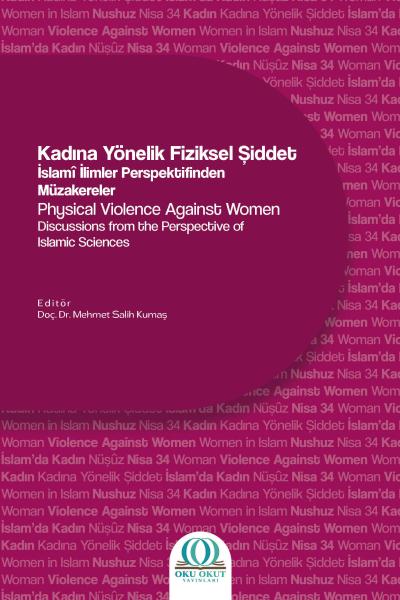Oku Okut Yayınları, kitabın yayım ve dağıtım hakkını saklı tutar. Ticari kullanım için yayınevine başvurulması gerekir.
Yazarlar
-
Doç. Dr. Mehmet Salih Kumaş (ed)https://orcid.org/0000-0001-7055-9799
This research stems from the Physical Violence Against Women workshop conducted in partnership with KURAV and Mudanya University on October 19-20, 2024. The inaugural session of the three-part program was entitled "Physical Violence in Legal and Psychological Contexts." During this session, Dr. Lwy. Vildan Sali delivered a paper entitled "The Concept of Physical Violence in Terms of Bodily Inviolability in Turkish Law," while Assoc. Prof. Hatice Kılınçer presented a separate paper titled "The Effects of Domestic Violence Against Women on Women, Spousal Relations, and Children."
Two further papers were presented in the second session, titled "Physical Violence Against Women from a Historical and Societal Perspective." The initial paper, titled "Physical Violence Against Women in Early Islamic Society," was delivered by Assoc. Prof. Feyza Betül Köse. The paper entitled "Reflection of Violence Against Women in Official Documents During the Ottoman Period" was delivered by Prof. Zübeyde Güneş Yağcı. During the concluding session, entitled "Physical Violence Against Women from a Religious/Jurisprudential Perspective," two further papers were delivered. The initial paper, entitled "The Use of the Word 'Battery' in the Quran Within the Context of the Truth of Verse 34 of Surah An-Nisa," was delivered by Prof. Dr. Yunus Vehbi Yavuz, while the concluding paper, titled "'Battery' and 'Nushuz' in the Dilemma of the Spiral of Violence and the Climate of Compassion," was presented by Prof. Saffet Köse.
The session concentrated on verse 34 of Surah An-Nisa and broadly addressed physical violence against women within the Islamic context, with participants proposing three primary approaches. The initial interpretation, grounded in the conventional understanding found in classical literature, posits that the term “iḍribûhunna” in the verse signifies a gentle striking, and that this constitutes a permission rather than an imperative. Comprehending the “ḍarb” necessitates an assessment alongside the psychological violence (nushuz) perpetrated by the woman who disparages her husband, undermines his worth, and willfully neglects her responsibilities towards him. The second approach posits that the term “ḍarb” encompasses multiple connotations, one of which is beating; however, this interpretation is inconsistent with the intent of the verse in question and the Islamic viewpoint on women. In this context, it is more precise to interpret the act of “ḍarb” as the expulsion of the woman or man from the home, rather than as physical assault. The third approach contends that the verb “ḍarb” in the passage signifies beating, however this interpretation is obsolete in contemporary context.
Bu çalışma, 19-20 Ekim 2024 tarihlerinde Kur’an Araştırmaları Vakfı (KURAV) ile Mudanya Üniversitesinin iş birliği ile yapılan Kadına Yönelik Fiziksel Şiddet Çalıştayı’nda sunulan tebliğ ve müzakereleri içermektedir. Üç oturumda gerçekleştirilen çalıştayın birinci oturumu, Hukukî ve Psikolojik Boyutuyla Fiziksel Şiddet başlığını taşımaktadır. Bu oturumda Dr. Av. Vildan Sali, “Türk Hukukunda Beden Dokunulmazlığı Açısından Fiziksel Şiddet Kavramı” başlıklı bir tebliğ; Doç. Dr. Hatice Kılınçer ise “Kadına Yönelik Aile İçi Şiddetin Kadın, Eş İlişkisi ve Çocuklar Üzerindeki Etkileri” başlıklı bir başka tebliğ sunmuştur.
Tarihi ve Toplumsal Açıdan Kadına Yönelik Fiziksel Şiddet başlıklı ikinci oturumda yine iki tebliğ sunulmuştur. “İlk Dönem İslâm Toplumunda Kadına Yönelik Fiziksel Şiddet” başlıklı birinci tebliğ Doç. Dr. Feyza Betül Köse tarafından; “Osmanlı Dönemi Kadına Yönelik Şiddetin Resmî Belgelere Yansıması” başlıklı tebliğ ise Prof. Dr. Zübeyde Güneş Yağcı tarafından sunulmuştur. Dinî/Fıkhî Açıdan Kadına Yönelik Fiziksel Şiddet başlıklı son oturumda da yine iki tebliğ sunulmuştur. “Nisâ Sûresi 34. Âyetin Hakikati Çerçevesinde Kur’ân’da Darp Kelimesinin Kullanılışı” başlığını taşıyan birinci tebliği Prof. Dr. Yunus Vehbi Yavuz sunmuş; “Şiddet Sarmalı ve Şefkat İklimi İkileminde ‘Darb’ ve ‘Nüşûz’” başlıklı son tebliğ de Prof. Dr. Saffet Köse tarafından sunulmuştur.
Çalıştayda özelde Nisâ Sûresi’nin 34. âyeti, genelde İslâmî paradigma çerçevesinde kadına yönelik fiziksel şiddet olgusu üzerine odaklanılmış ve katılımcıların üç temel yaklaşım ortaya koyduğu görülmektedir. Birinci yaklaşım, klasik metinlerde benimsenen yerleşik anlayışı esas alarak âyette geçen idribûhünne ile kastedilenin, hafif şekilde dövme olduğu; bunun da emir değil, bir ruhsat olarak kabul edilmesi gerektiği yönündedir. Buradaki darbı, kocasına tepeden bakan, onu değersizleştiren, ona karşı görevlerini bilinçli bir şekilde ihmal eden kadının uyguladığı psikolojik şiddetle (nüşûz) birlikte değerlendirmek gerekir. İkinci yaklaşıma göre “darb” sözcüğünün birçok anlamı vardır. Bunlardan biri dövmek olsa da bu anlam, ne ilgili âyetin amacına ne de İslâm’ın kadına bakış açısına uygun düşmektedir. Bu durumda “darb” fiilinin, dövmek yerine kadının veya erkeğin ortak yaşam alanından uzaklaşması şeklinde anlaşılması daha doğrudur. Üçüncü yaklaşım ise âyette geçen “darb” fiilinin dövmek anlamına geldiğini ancak bu anlamın günümüz açısından artık bir anlamının kalmadığını savunmaktadır.
Telif Hakkı
Telif Hakkı (c) 2025 Oku Okut Yayınları
Lisans

Bu çalışma Creative Commons Attribution-NonCommercial 4.0 International License ile lisanslanmıştır.
Yazar Biyografisi
-
Doç. Dr. Mehmet Salih Kumaş, Bursa Uludağ Üniversitesi
1977’de Kars’ta dünyaya geldi. 1994 yılında Kocaeli İmam Hatip Lisesinden, 1999 yılında Bursa Uludağ Üniversitesi İlahiyat Fakültesinden mezun oldu. 2000 yılında Uludağ Üniversitesi İlahiyat Fakültesi İslâm Hukuk Anabilim Dalında araştırma görevlisi olarak akademik hayatına başladı. 2001 yılında yüksek lisansını, 2008’de doktora tezini tamamladı. 2010 yılında YÖK bursuyla akademik dil geliştirmek için Suriye-Şam’da bulundu. 2011 yılında yardımcı doçent, 2021 yılında ise doçent unvanı aldı ve halen aynı kurumda İslâm Hukuku Anabilim Dalı’nda öğretim üyesi olarak dersler vermeye devam etmektedir. Evli ve beş çocuk babasıdır.
İndir
Yayın Bilgisi
-
Yayın TürüEditörlü Kitap
-
Yayım Tarihi21 Ekim 2025
-
Dizi
-
Kategori
-
ISBN-10 (02)625-95679-9-0
-
ISBN-13 (15)978-625-95679-9-0
-
Proprietary (01)48
-
Date of first publication (11)21.10.2025
Bu kitapla ilgili ayrıntılar
Kumaş, Mehmet Salih (ed.). Kadına Yönelik Fiziksel Şiddet: İslamî İlimler Perspektifinden Müzakereler. critical ed . Ankara: Oku Okut Yayınları, 2025. https://doi.org/10.55709/okuokutyayinlari.84












